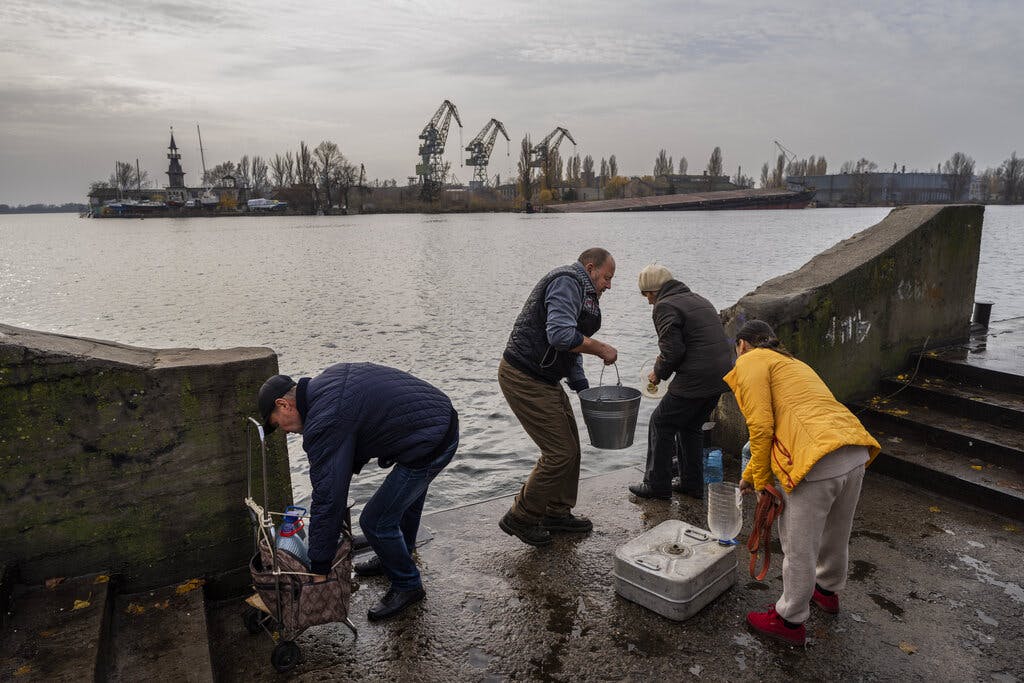Fearful Russia Digs Homeland Line of Defense Against Ukraine
The very fact of a Russian official publicly admitting to being on the defensive is cause for optimism in the Ukrainian capital.

In the latest sign that after nearly nine months of war the tables are turning, Russia will be building a defensive line in its Belgorod region in a bid to defend itself against potential Ukrainian attacks from south of the border. The regional governor, Vyacheslav Gladkov, made the announcement at a press conference and cited the tense situation on the border with Ukraine but did not offer many specifics. He hinted that some defense works may have started as far back as April.
Beginning that month, Mr. Gladkov said, “we have been actively engaged in strengthening the borders” and “in any case, we are considering several options for the development of events; I hope we will not need pessimistic options.” He also did not spell out what those “pessimistic” options might be, but the very fact of a Russian official publicly admitting to being on the defensive is cause for optimism in the Ukrainian capital, Kyiv. Ukraine’s second-largest city, Kharkiv, lies just opposite the border from Belgorod and most Russian forces had withdrawn from the Kharkiv region by mid-September.
Ukrainian forces, on the other hand, have been delivering counterattacks on Russian targets in the Belgorod region since at least late March, when an airstrike against a Russian fuel depot at the city of Belogrod was widely attributed to Ukraine. Numerous cross-border attacks were reported both prior to and following the Russian retreat from Kharkiv. Ukraine has generally denied responsibility for these attacks, but the Russians of Belgorod are aware of the perils of proximity to a Ukrainian army that has proven itself to be a much fiercer foe than anyone anticipated. Mr. Gladkov may have had that in mind when he explained that he would not give details on the defensive line because his statements “are listened to quite carefully by our enemies.”
There are indications that Russia may have even bigger fears as well. The Russian newspaper Kommersant reported that the defense line going up in Belgorod may actually be a continuation of the so-called Wagner Line already being created in the Russian-backed, self-declared Donetsk and Luhansk “people’s republics” in Ukraine’s embattled eastern Donbas region. The newspaper cites a representative of the Wagner group, Andrey Bogatov, as saying that a “defense in depth for hundreds of kilometers” is already under way in Belgorod.
If true, this begs the question: For just how big of a fight along its southern border with Ukraine is Russia girding? That is unknown, and it may be that the Russian authorities simply feel a need to offer more protection for civilians against sporadic attacks from northern Ukraine.
More details have emerged, however, about what the defensive line could look like. Satellite imagery from the European Space Agency last month showed a trench with four rows of cement pyramids dug outside a Russian-occupied town in eastern Ukraine. Those are meant to keep out tanks and other armored vehicles. It is part of the Wagner Line, and according to Zvedza TV, affiliated with the Russian military, it is a “second line of defense” against a potential Ukrainian advance there.
There have also been periodic reports in the Russian press of border defenses going up in other southern Russian regions near Ukraine, such as Voronezh and Kursk. Last month, Kommersant reported, Mr. Gladkov mentioned on his Telegram channel that “protective structures” would be going up at Belgorod.
All of this comes after Russia’s humiliating recent retreat from Kherson. The prospect of Russians having to hunker down inside their own borders will only add to that ignominy. It is in this context that one can see new reports that the Kremlin is considering a second wave of troop mobilization to shore up its spectacularly failing efforts to subdue Ukraine.
According to the Moscow Times, the deputy head of the Moscow branch of the liberal Yabloko party wrote on Telegram, ”There is no doubt that a new wave of mobilization will begin in mid-January.” During a press call on Monday, the Kremlin spokesman, Dmitry Peskov, said, “I cannot speak for the Ministry of Defense. There are no discussions on this matter in the Kremlin.” In other words, he did not rule it out.

